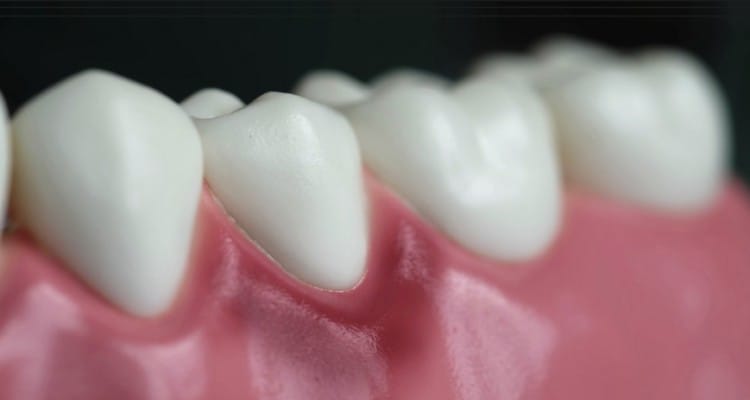There’s very little quite as worrying as looking in the mirror and suspecting that you may in fact have receding gums. To a certain extent, gum recession represents a natural part of the aging process and isn’t necessarily anything to worry about. In fact, in most instances receding gums themselves do not pose any significant health risk. However, there is always the possibility that receding gums may be a sign or symptom of an underlying condition which requires treatment. In addition, it is important to approach receding gums proactively and mindfully, in order to ensure they are not allowed to get considerably worse over time.
Of course, just as is the same with every other matter regarding oral health across the board, it is in your best interests to speak to your dentist as soon as you know what could be a problem. There may be nothing to worry about, or it could be that one or more courses of treatment are required to bring the problem under control. Either way, it is better to find out at the earliest possible juncture.
What Causes Gum Recession?
But in terms of what actually brings the problem on in the first place, what are the most common causes of receding gums?
Well, the simple answer is that gum recession can be the result of several different things or a symptom of an underlying condition. It’s important to speak to your dentist to assess what exactly is the situation in your case, though in most instances gum recession can be attributed to one or more of the following:

- Aggressive Brushing or Flossing. First of all, if you tend to be a little too aggressive and abrasive when it comes to your oral hygiene regime in general, you may unknowingly be causing damage to your gums. If concerned, switching to the very best electric toothbrush for gum care could represent a good place to start, or perhaps switching to the best water flosser recommended by dentists instead of using manual floss. Whatever you use, be sure to use it gently and with the utmost of care.
- Genetics. There’s also every chance that your own case of receding gums could be caused by your genetics. The simple fact of the matter is that if there is a history of gum recession in your family, you are naturally more likely to face the same problem yourself. This doesn’t mean that there still isn’t plenty you can do to help treat and avoid the problem, but it does nonetheless mean that you are more likely to face receding gums sooner or later.
- Bruxism. Another common cause of gum recession is bruxism – aka teeth grinding. Even if you are not aware of the fact that you are grinding your teeth, there is every chance you may be doing so at night without even realising it. Signs and symptoms of teeth grinding include waking up with headaches, unexplained pains in the teeth and jaw and ultimately gum recession or damage to the teeth. If you believe you may be grinding your teeth, speak to your dentist about available treatment options including mouth guards.
- Poor Oral Health. It could also be that the root cause of your gum recession is nothing more than an inadequate oral health regime. Just as is the case with all other parts of your body, your teeth and gums can only perform as they are supposed to perform if they are kept in the best possible condition. And when it comes to keeping your mouth in general in the best possible condition, this means a flawless oral health regime and the very best products available to you.
- Gum Disease. On top of all of this, receding gums are often one of the most characteristic symptoms of gum disease. It is perfectly possible to prevent and treat a gum disease with an outstanding good oral hygiene regime, though is nonetheless something that should be brought to the attention of the professionals at the earliest possible juncture.
Receding Gums Treatment
On the plus side, if you have noted what appears to be only a very mild case of receding gums, the outlook could be predominantly positive. The reason being that if you catch receding gums early enough, there is plenty that can be done to help treat and combat the problem, without having to resort to professional treatment. It is simply a case of first identifying what it is that is causing your gums to recede, in order to then map out a home treatment process accordingly. There is a good chance it will be nothing more complicated than simply stepping up your everyday oral hygiene regime, which over time could add up to a huge difference.
However, if the problem is relatively severe or advanced, it will be necessary to speak to a gum specialist to decide on how best to approach the problem. There’s every chance they will likewise recommend an enhanced oral hygiene regime in general, along with specialist products or treatments. It may also be necessary (or at least optional) to undergo surgical treatment to physically reverse the problem, using a process that is referred to as a gum graft. It is not usually necessary to undergo such surgery for medical reasons, but rather to improve the appearance of your teeth and gums aesthetically.
Avoiding Gum Recession
There are essentially two extremely effective ways of giving yourself the best possible chance of avoiding gum recession in the first place. The first of these is to look after your mouth with the full care, respect and attention it deserves, using the very best products on the market as recommended by dentists. The better the condition you keep your mouth in, the lower the likelihood of developing any oral health problems across the board.
On top of this, paying regular visits to your dentist will ensure that a trained professional is able to keep an eye on your oral health on an on-going basis, giving them the opportunity to detect and prevent emerging problems before they become genuinely problematic. There’s every chance your dentist will in fact spot a problem with receding gums long before you would, meaning much more time to ensure the problem isn’t given the opportunity to grow and develop.
